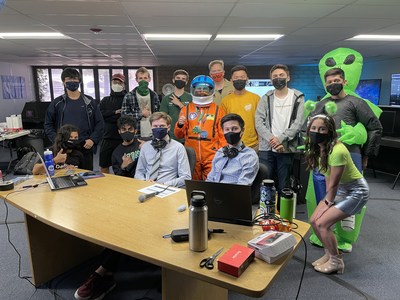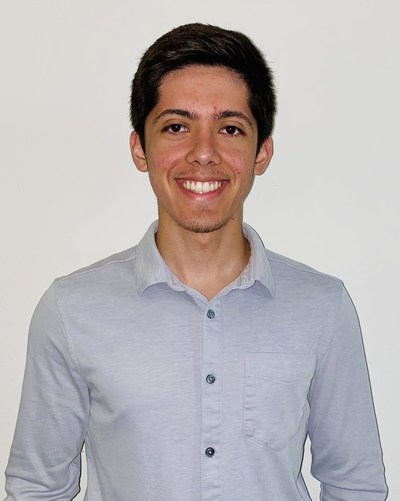THOUSAND OAKS, Calif., Oct. 19, 2021 /PRNewswire/ — Today synED, a national non-profit organization that identifies emerging best practices for effective articulation between employers, job seekers, and education providers, announced that Luis Plascencia, a Computer Science student at California Polytechnic State University in San Luis Obispo (Cal Poly), is this month’s CyberHero.
Luis is a third-year student at Cal Poly and a native of the nearby coastal town of Cambria, California. His story exemplifies both the power of cybersecurity competitions to inspire young people to cyber careers and the power of young people to make a difference in the world, given the tools and space to lead.
Luis was only introduced to cybersecurity competitions as a high school sophomore, when a teacher convinced him to lead a team in the California Cyber Innovation Challenge (CCIC). Now, he’s helping design, manage and write code for the same cybercrime-solving competition while leading cybersecurity and digital transformation outreach efforts at his university and beyond.
"I’m definitely super grateful to be in this position, to help other students that are in the position that I was back in high school," Luis said.
"Luis is not only an incredible employee, but an incredible human being," Danielle Borelli, Operations Coordinator at CCI, said. "He is often up at 5am every day, starting his day off with self-reflection and journaling. He then breaks into additional challenges or learning new skills, all before the workday begins. Going above and beyond is just who Luis is."
An annual event organized by the California Cybersecurity Institute (CCI), the CCIC went from in-person to virtual when the COVID-19 pandemic hit in 2020. Participation has actually increased, however, with over 400 students last year and about the same number this year. The competition utilized Amazon Web Services’ Sumerian tool in 2020 and used Unity, a game development platform, for this year’s competition. Students search virtual rooms for clues, scour computer files, and analyze evidence using cybersecurity software.
In 2020, Luis helped the team transition the in-person aspects of the CCIC to virtual. Now CCI has no plans to return to in-person competitions. "Having it virtual gives an opportunity to more students to compete, regardless of their situation," Luis said. "We think that’s a very valuable aspect, because we do want to highlight those students that are underrepresented."
Luis was the project lead for CCIC this year, helping with coding, developing the answer key and evidence chain, even programming several bots to help teams that get stuck during the competition. When CCI puts on a new Space Grand Challenge cybercompetition in April next year, Luis will be leading the student team developing the code. The Space Grand Challenge, which will task students with solving a simulated cybercrime on a communications satellite, will be open to participants from other states and even other countries, including Australia.
The CCIC this year allowed participants to collaborate on Discord servers while they competed, and also incorporated a livestream of the event through the e-sports and gaming platform Twitch, which allowed close to a thousand spectators to watch the action throughout the day.
"Last year we found that parents and spectators didn’t have a chance to see what students were doing," Luis said, "so we wanted to find a way to help these people understand what these high school and middle school students are doing, and one way that we found was pretty useful was creating a Twitch livestream during the competition where anyone can join in."
Twitch, which allows viewers to watch in-game action and communicate with each other, donated two hours of its homepage to the CCIC on the day of the competition. Cal Poly’s student e-sports club was brought in to help with the gamification of the competition, helping to promote the event and run the Twitch livestream.
Gamification is increasingly being recognized as an avenue for improving education outcomes in a variety of ways – as discussed in SynED’s most recent ReportOUT, a quarterly review of innovative applications in alternative education.
"Luis is an amazing coworker, an amazing person. The first word that comes to mind is ‘committed,’" said Sal Gutierrez, a student at Cal Poly and Lead Educator & Software Developer at CCI. "He’s a very committed individual, and that’s something I really admire about him. If you have to rely on him, he is going to do it, no matter what, and he’s going to get it done by the deadline."
Sal credits Luis with getting him more involved – and getting him a job at CCI. After deciding to create the Digital Transformation Club at Cal Poly early this year, Luis convinced Sal to join him and help lead the new group as Vice President. "I remember he told me, ‘Sal, join this club and it will change your life.’ He was not kidding!"
The Digital Transformation Club focused at first on basic cybersecurity and computer science-related education for Cal Poly students but has since broadened its aims. Luis came up with the idea to include students from a wider variety of majors and disciplines and try to tackle a complex problem each school year. This year, they are seeking to develop novel solutions to climate change in San Luis Obispo and at Cal Poly.
Luis also works on CCI’s Cyber to Schools program, helping underserved students around the country learn progressively more challenging computer science and cybersecurity areas of knowledge, and find nontraditional pathways to cyber careers. Last summer, they trained more than 800 students from K-12 schools in the Cherokee Nation, Kansas City, Inglewood, and elsewhere.
"He came in as a software programmer and was developing and doing all of these things on the backend, with coding, architecting on AWS, all of that. He’s such a talented individual," said Makenna Downing, Marketing and Communications Coordinator at CCI. "We were blown away by his skills, so he’s really become an asset to the team. A remarkable example of student interns and what they can do, every success that they can accomplish."
Luis is exploring his options for post-graduate studies and career paths, including a fifth-year master’s degree option at Cal Poly. "Some areas that interest me are data science or cloud computing, and I’ve been playing around with them a little bit to get an idea of what it’s like," Luis said. "But cybersecurity would definitely be a top one."
What began with an Introduction to Cybersecurity course in high school, and that first cybersecurity competition, has turned into a passion that will undoubtedly lead to a successful career in cybersecurity or computer science.
"I feel like Luis is already above our paygrade. We all joke, ‘we’re going to be working for him one day," concluded Ms. Downing.
About SynED® CyberHero’s Series
SynED’s CyberHero’s series is a monthly column published nationally that highlights individuals who quietly go above and beyond in helping to secure our nation and communities by developing cyber talent. SynED is a national non-profit that identifies and highlights emerging best practices for effective articulation between employers, job seekers, and education providers. SynED is the proud recipient of the 2021 Association for Career & Technical Education Business-Education Partnership Award.
Contact:
Liz Fraumann
866-420-4573
321636@email4pr.com
SOURCE synED



